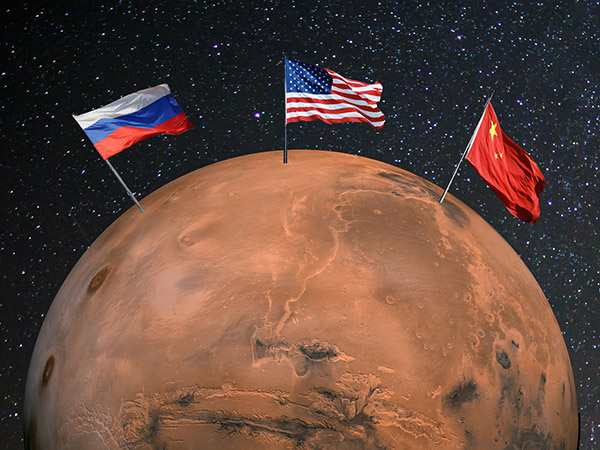
JUSTIFYING THE COST OF INTERSTELLAR TRAVEL
The need to explore is at the heart of human existence. People have always explored the world around them as part of a primordial journey of discovery. Great explorers – like Marco Polo, Christopher Columbus and James Cook – led the spread of civilisation and helped humanity discover the unknown.
From the Stone Age to the Space Age, humans have pushed new frontiers to overcome what was once thought impossible. Human ventures have resulted in us navigating the seas, discovering new lands, conquering the skies and exploring the cosmos.
For eons, Earthlings have looked at the heavens and wondered about the celestial bodies in our solar system. Mars, the big red dot in the night sky, has long fascinated us. Indeed, no other planet has fired the human imagination as much as our neighbouring planet.
Throughout history, Mars has been embraced in myths (home of little green men), religions (named after the Roman god of war), literature (sci-fi tomes such as The War of the Worlds about extraterrestrial invaders) and cinema (Hollywood has released dozens of movies about Mars and Martians).
The lure of the Red Planet has also proved irresistible to NASA. America’s space agency wants to land a human crew on Mars in the 2030s – potentially as early as 2035. Between now and then, hundreds of billions of dollars will be spent in the countdown to put boots on the red Martian surface. But is it worth the stratospheric cost?
Astronauts are not budget travellers which is why spaceflights are so expensive. A manned mission to Mars is an extremely complex and long-timescale project which will burn through stacks of money – perhaps as much as half a trillion dollars.
No one in their right mind would consider this amount of money to be small change. Even so, it is – in the opinion of Mars exploration advocates – a sound and sensible investment. Opponents, of course, have a different view and see deep space exploration as an extravagance that we can ill afford.
The tension between those dreaming of a second home on a Red Planet and those prioritising the home we currently have on our Blue Planet is the most polarising issue in the Mars debate. The opportunity for Homo sapiens to shrug off their terrestrial bonds has divided us.
Many believe that the long-term benefits of space exploration are overshadowed by short-term earthly concerns. Those focussed on the “here and now” invoke the old catchcry that the money could be better spent elsewhere on more pressing issues such as the fight against world hunger.
Critics of interplanetary exploration also believe that the claimed scientific and social benefits of such pursuits are pie-in-the-sky. They would prefer to see their tax dollars deployed to yield immediate improvements in tangible areas such as national infrastructure and health care.
Personally, I am a strong proponent of humankind’s next giant leap to colonise another world. I accept that establishing a permanent human settlement on Mars is an eyebrow-raising idea. Yet it’s a dream that has captured the collective imagination of mankind more than any other.
Whether it’s private companies like SpaceX or government organisations such as NASA, the race to Mars is well and truly on. The shared space vision of many countries seems to be “Conquer Mars”. Only four entities – the US, Russia, India and the European Space Agency – have successfully entered the Martian orbit. However, membership of this elite club is set to expand.
Last July, America, China and the United Arab Emirates all launched unmanned spacecraft to Mars. The closeness of the three launches was no coincidence. Each was timed to take advantage of a one-month window in which Mars and Earth were in the nearest alignment on the same side of the Sun. This allowed for the shortest possible trip – a mere 55 million kilometres!
The space route to the Red Planet is becoming increasingly busy. A growing number of nations are blasting off to Mars with each looking to find their specific niche. While they have different objectives, Mars is shaping up as the next symbol of humanity’s enduring quest for exploration.
Many prominent scientists believe that establishing a colony on Mars is a worthwhile endeavour which will produce myriad long-term benefits for society. The three most often cited pay-offs are as follows.
- Ensure the future of humankind
Prior to his death, Professor Stephen Hawking made the bleak prediction that humanity must colonise another planet within 100 years or face possible extinction. “With climate change, overdue asteroid strikes, epidemics and population growth, our own planet is increasingly precarious,” warned Hawking.
Like Elon Musk, Hawking believed that we have no choice as a species but to become multi-planetary – starting with the colonisation of Mars. Musk views Mars as a “backup planet” should something apocalyptic destroy the Earth. Dinosaurs roamed the Earth for 165 million years until a colossal asteroid wiped them out – and the fear is that it could happen again.
If humans ever need to beat a retreat from Earth due to some doomsday event, we will need somewhere to go. Musk thinks that we may be ready to start shuttling people between Earth and Mars in the next decade or so. If all goes well, then perhaps 40 or 100 years later, Mars could be a self-sustaining colony of a million people.
- Search for signs of life on Mars
Understanding whether extraterrestrial life exists and/or existed elsewhere in the universe is a fundamental question of humankind. While Mars today is dry and barren, it wasn’t always a desolate wasteland. Water, which is critical to life, was stable on the surface of Mars for about a billion years. In the same way that life evolved on Earth, it is likely to have followed a similar path on Mars.
As noted in an article authored by political scientist, Darrell West, and published by The Brookings Institution, the question of the origins of life is central to science, religion, and philosophy. Humans have long assumed that life was unique to Earth and not present elsewhere in the solar system, let alone the universe. We have constructed elaborate religious and philosophical narratives around this assumption and built our identity along the notion that life exists exclusively on Earth.
If future space missions cast doubt on that assumption or outright disprove it by finding remnants of microbial life on other planets, it will be both invigorating and illusion-shattering. We humans will be forced to confront our own myths and consider alternative narratives about the universe and the place of Earth in the overall scheme of things.
- Develop new technologies
Many everyday conveniences we use in our daily lives stem from innovations in space technology. For example, the memory foam you lay on for a good night’s rest was initially developed to improve the comfort of astronauts on long space flights. Also, every photo you snap on your smartphone is possible due to small imaging sensors originally developed by NASA. Further, the water purification systems developed for the International Space Station are now used to help remote communities address water shortages.
Pushing the boundaries of human exploration invariably leads to discoveries in science and technology which deliver unintended benefits to humanity. The world already benefits greatly from space technology, especially with regard to satellites and global positioning systems which have revolutionised banking, navigation, and everyday communications.
Space technology orbits our daily lives without us even noticing, and the Mars missions will undoubtedly deliver further benefits. Successfully landing on and colonising Mars will require NASA and other space agencies to pioneer further innovations and the technology developed will ultimately find its way into our lives. For example, laser-based technology being develop for Mars landings will likely be used on Earth to make self-driving cars safer.
■ ■ ■
As a young boy, I watched in awe as Neil Armstrong walked on the Moon and I hope that in my lifetime I will also get to see humans walk on the Red Planet. Mars is a modern-day New World, and a human colony on this planet is the next great adventure. Let the countdown begin.
Three, two, one … we have lift off!
Regards
Paul J. Thomas
Chief Executive Officer
Ductus Consulting


We can’t put a price on new technologies because they are priceless this will be a very worthwhile cause . Great blog thank you.
Hello Paul,
I really enjoyed your analyses and hearing both sides of the case.
Also appreciated the opportunity to read Stephen Hawking’s quotation; it supports your contention of getting on with it!
Thank You!
Des
A very interesting read-Thank You!
Paul, so interesting. It puts an interesting perspective on this subject.